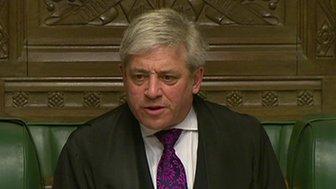Bercow rides to rescue for backbenchers
- Published
- comments
Monday night's vote on sex-selective abortion in the Commons might not have happened, but for a bit of activism from the chair….and the whole incident highlighted one of the big weaknesses in the way the House considers legislation.
The story so far:

Swift work from the Speaker ensured the amendment got debating time
A hundred or so MPs had signed an amendment to the Serious Crime Bill, from the Conservative Fiona Bruce, to outlaw abortions being performed solely on the basis of the gender of the unborn child, and, unusually, a generous two hours had been set aside in which to debate it in the programme motion for the bill's report stage consideration.
But that programme motion was obsolete before the debate ever started.
It was drafted on the assumption that the debate would start immediately after question time, at 3.30pm. That timing was thrown out by two entirely predictable events - first the Prime Minister was due to make a statement on the latest EU Summit, and then there was an Urgent Question on HSBC.
By the time those two items were disposed of, it was almost 5pm, and according to the original programme motion the first section of the report stage debate, covering child protection issues and FGM would have had to be disposed of in about 15 minutes…
So the original programme motion was junked, and the House reverted to the default order of debate, in which government new clauses would be debated first, then other new clauses, then amendments in the order in which they occurred in the bill. So far, so boring, but the effect of that batting order was to put the abortion amendment right at the end of the queue, where it might not be reached, and could fall without being debated at all.
Protests and points of order, predictably, followed.
Some suspected a plot to avoid a difficult vote, because the prime minister's statement had been timetabled in at least ten days before and urgent questions on a Monday are hardly unusual, so it had always looked likely that the debate would be squeezed. The influential Conservative backbencher, David Burrowes, lobbied the Speaker hard, to ensure the amendment was reached, and was given an unusually positive response.
And in the hours that followed the Speaker speeded the debate through with glares, throat-clearings and quiet words with the whips - and lo! a crisp, pacey debate followed, which allowed an hour on abortion at the end.
Now maybe the Speaker was pushing at an open door, and maybe the whips realised that shutting off a debate on an awkward issue would create more trouble than it forestalled, but the sight of the Chair effectively imposing his own timetable for debate was an unusual one, but one which a lot of backbenchers will welcome.
The point is that report stage debates on bills are, in theory, the point where any MP or group of MPs can do detailed law-making, but in practice, over-tight timetabling often squeezes out that opportunity. To its credit, this government has been a bit more willing to allow two-day report stages, which give backbenchers more chance to influence legislation - particularly when the saintly Sir George Young was Leader of the House.
But that trend has rather petered out more recently, which means that opportunities for individual MPs to influence some very big bills - the recent Infrastructure Bill springs to mind - have been more limited.
And if we get - as many expect - a more multi-polar hung parliament after the next election, the Commons will need a process which is sufficiently open to allow all parties to have a voice.